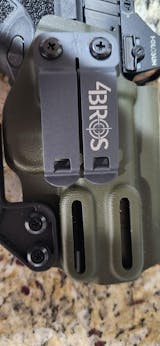
Jeff Cooper’s Principles of Personal Defense - With Modern Takeaways
Jason PineShare
When it comes to personal defense, few names carry as much authority and respect as Jeff Cooper. A United States Marine, firearms instructor, and author, Cooper is often called the father of modern combat pistol shooting. His book "Principles of Personal Defense," first published in 1972, remains one of the most influential works in the world of self-defense and situational awareness.
At its core, Cooper’s philosophy isn't just about shooting skills—it's about mindset. He outlines seven key principles that every responsible citizen should internalize when it comes to defending themselves or their loved ones.
In the days of Social Media and Cell Phones, these principles must be adapted even more so to improve your situational awareness.
Here’s a breakdown of each, along with how it applies today.
Principles of Personal Defense—And What They Mean for You Today
1. Alertness
"The first principle of personal defense is alertness."
Cooper emphasized the importance of being aware of your surroundings. This doesn’t mean being paranoid but actively observing who and what is around you. Criminals rely on the element of surprise—taking that away is your first defense.
Modern Takeaway: Put the phone down when walking to your car. Scan your environment. Identify exits in unfamiliar places. Awareness buys you time, and time buys you options.
2. Decisiveness
"Decide ahead of time what you will do if faced with a threat."
In a moment of crisis, hesitation can be deadly. Cooper urged people to make decisions quickly and confidently. This principle ties directly to mental preparation—you must already have a plan in mind so you’re not caught in a freeze response.
Modern Takeaway: Mental rehearsal is key. Think through scenarios. What would you do if someone tried to carjack you at a stoplight or break into your home?
3. Aggressiveness
"The best personal defense is an explosive counterattack."
This doesn’t mean being reckless or picking fights—it means that once you’re forced to act, you act with total commitment. A half-hearted defense may not be enough to stop a determined attacker.
Modern Takeaway: If your life is in danger, your goal is to end the threat as quickly and decisively as possible. Timidity won’t cut it.
4. Speed
"Speed is the essence of war."
Speed goes hand-in-hand with decisiveness and aggressiveness. If you're going to act, you must do so faster than your attacker can adjust or react.
Modern Takeaway: Speed doesn’t mean rushing—it means efficiency. Know your tools, practice your draw, and refine your movements. In a true emergency, smooth equals fast.
5. Coolness
"Keep your head."
Keeping calm under pressure is easier said than done, but Cooper believed it was critical. Panic leads to poor decisions, wasted movement, and failed defense.
Modern Takeaway: Stress inoculation through training can help. Drills, simulations, and practice sessions under pressure build your ability to stay calm when it matters most.
6. Ruthlessness
"If you must defend yourself, be prepared to do so without mercy."
This principle is about survival, not cruelty. If you're forced to defend your life, you must do what is necessary to stop the threat. Mercy can come after you're safe.
Modern Takeaway: Understand the moral and legal implications of self-defense, but don’t let hesitation endanger your life. Your goal is to survive.
7. Surprise
"Do the unexpected."
A well-timed, unexpected response can disrupt an attacker’s plan. Cooper encouraged defenders to avoid being predictable and to keep control of the situation through innovation.
Modern Takeaway: Vary your routines. Train in multiple environments. Think like an attacker so you can stay one step ahead.
Final Thoughts
Jeff Cooper’s Principles of Personal Defense are just as relevant today as they were over 50 years ago. While technology and tactics have evolved, the mindset behind effective self-defense remains timeless.
At Four Brothers Holsters, we believe in preparing responsible citizens not only with quality gear but with the right mindset. Ultimately, it’s not the tool that wins the fight—it’s the person behind it.
Who Was Jeff Cooper?
Jeff Cooper (1920–2006) was a United States Marine Corps officer, firearms expert, and author who is widely considered the father of modern pistolcraft. His contributions to the world of personal defense extend far beyond the shooting range—he pioneered a way of thinking about self-defense that emphasizes mindset, discipline, and individual responsibility.
Cooper founded the American Pistol Institute (now known as Gunsite Academy) in Arizona, where he trained thousands of students in what he called the Modern Technique of the Pistol—a system that transformed how defensive handgun shooting is taught.
His seminal book, Principles of Personal Defense, outlines seven core tenets that have guided law-abiding citizens, law enforcement, and military personnel in defending themselves against violent threats.
More than a firearms instructor, Jeff Cooper was a philosopher of preparedness. He believed that the armed citizen must be not only skilled but also mentally prepared—alert, decisive, and confident—in the face of danger.
You can learn more about Jeff Cooper at the Jeff Cooper Legacy Foundation.







1 comment
Thank you for sharing this. I have been very forward in teaching my 2 daughters (4 & 8 yrs old) as well as my wife about being way more aware, prepared, & ready to overcome any situation that may jump out at us or her and our Princess Brigade. This little exert has inspired me even more to teach my family and friends more about all 7 of these points. I look forward to, hopefully, acquiring and reading Mr. Cooper’s book and utilizing his teachings to better my family’s chance of survival in any situation.
Cheers! BTW my holster is still holding solid on my sig 365xl. Looking to add a duty one for my Xmacro. 🤙🇺🇲